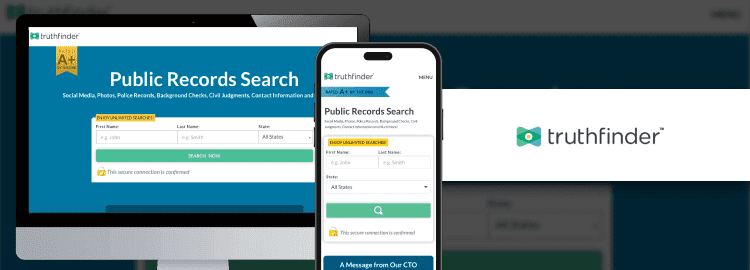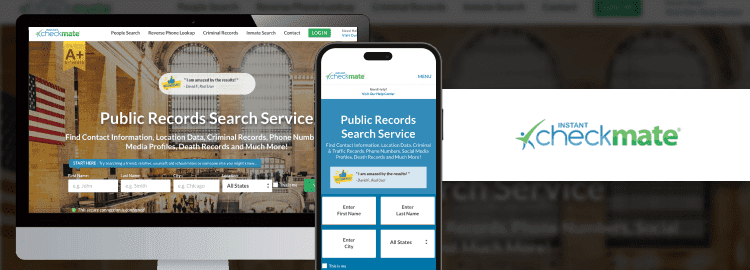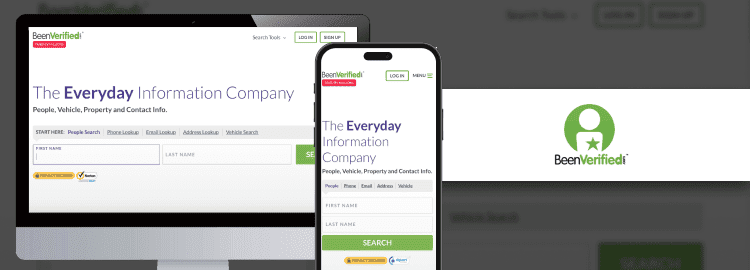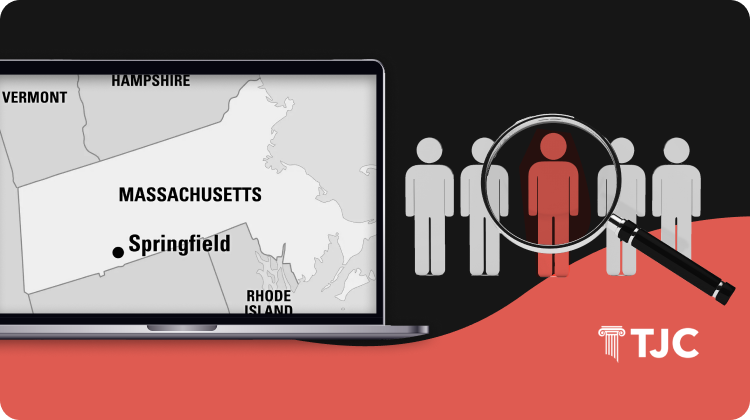Conducting background checks in Massachusetts is crucial for verifying individuals’ histories and ensuring their reliability. These checks are essential for purposes like employee hiring, tenant screening, and personal verification.
This article will cover the basics of background checks in Massachusetts: the laws that govern them, the procedures to follow, and recommended services for conducting them.
Need a Background Check?
Get StartedWhat Is a Massachusetts Background Check?
A Massachusetts background check involves gathering information from various records to understand someone’s history. Employers, landlords, and individuals find these checks valuable for ensuring they’re dealing with trustworthy individuals.
In Massachusetts, these checks help maintain safety and trust in communities. For example, an employment background check can help employers confirm a candidate’s qualifications and integrity. Landlords use them to screen potential tenants, and individuals might use them to verify personal connections. Knowing how to conduct a background check can save you from potential headaches down the line.
How Do I Get a State Background Check in Massachusetts?
Here’s a step-by-step guide to getting a state background check in Massachusetts:
- Visit the Massachusetts iCORI Website: Head over to the Massachusetts Department of Criminal Justice Information Services (DCJIS) iCORI website.
- Create an Account: If you don’t have an account, sign up with the necessary details. If you already have one, just log in.
- Enter the Required Information: Fill out the form with the person’s details, like their full name and date of birth.
- Review and Confirm: Double-check everything to make sure it’s correct. This helps avoid any mistakes or delays.
- Pay the Massachusetts Background Check Cost: Go to the payment section and pay the fee. Costs can vary depending on what you’re looking for.
- Submit the Request: Once you’ve paid, submit your background check request through the iCORI platform.
- Receive the Report: After it’s processed, you’ll get a report with criminal records, court records, and other important info.
What Shows up on a Massachusetts Background Check?
Here’s a breakdown of the common types of background checks and the typical information they uncover:
Education Verification
Education background checks in employment background screening confirm an individual’s educational background, including degrees, diplomas, and certifications from educational institutions. These checks are crucial for ensuring candidates possess the necessary qualifications for positions that require specific educational credentials.
Driving Record Checks
Driving record checks reveal an individual’s history of driving-related activities, such as traffic violations, license status, and any driving offenses. Employers, especially those hiring for driving-related positions, use these checks to ensure candidates have a clean driving record and are reliable on the road.
Criminal Background Checks
A criminal background check reveals any criminal history, including misdemeanors and felonies. This type of check is crucial for employers to ensure they are not hiring individuals with a violent or dishonest past. It is also commonly used by landlords to screen potential tenants for any criminal activity. In Massachusetts, criminal background checks help maintain a safe work and living environment by identifying individuals with a criminal record.
Drug Testing
Drug testing is often part of employment background checks. It includes screening individuals for illegal substances to maintain a drug-free workplace. Employers use these tests to prevent substance abuse problems that could impact job performance and safety. In Massachusetts, employers conduct drug testing during hiring to support a healthy and productive work environment.
Civil Court Searches
Civil court searches examine whether an individual has been involved in civil lawsuits, restraining orders, or other court proceedings. They are valuable for landlords and employers to assess an individual’s legal history and potential risk.
In Massachusetts, landlords often conduct civil court searches to discover any prior disputes with former landlords or legal issues that could signal potential problems. Similarly, employers use these searches to uncover any legal disputes that might affect a candidate’s suitability for a position.
Employment Verification
Employment verification confirms an individual’s past employment details. This includes job titles, dates of employment, and reasons for leaving previous jobs. Employers use this information to verify a candidate’s work history and reliability, ensuring they are hiring someone with a proven track record.
In Massachusetts, employment verification helps employers avoid hiring individuals who may have falsified their work history. It provides an additional layer of security by confirming that a candidate has the experience and stability required for the job.
Credit Background Checks
Credit background checks review an individual’s credit history, including credit scores, outstanding debts, and payment records. Though not always included in standard employment screenings, they hold particular importance for positions involving financial duties.
Employers in Massachusetts use credit background checks to assess the financial responsibility of candidates applying for roles that handle money or sensitive financial information. This helps ensure that employees in these positions are trustworthy and capable of managing financial tasks responsibly.
What Shows Up on a Massachusetts CORI Check?
A Massachusetts CORI (Criminal Offender Record Information) check reveals detailed information about an individual’s criminal history. This includes misdemeanors, felonies, and other criminal offenses recorded in Massachusetts. CORI checks are essential for employers, landlords, and other entities who need to evaluate a person’s criminal background.
CORI checks are crucial for roles involving vulnerable groups like early education and healthcare. They provide detailed criminal histories that help organizations ensure safety. Massachusetts laws govern this process to ensure accuracy and compliance.
How Far Back Does a CORI Check Go in Massachusetts?
In Massachusetts, a CORI check can include an individual’s entire criminal history, with no limit on how far back it can go. This ensures that all offenses recorded, regardless of when they happened, are reviewed. This is essential for roles needing high trust and responsibility, like in healthcare, education, and security.
However, there are specific limitations to background checks conducted by consumer reporting agencies (CRAs). According to Massachusetts General Laws, Chapter 93 §52, most background checks conducted by CRAs are limited to a seven-year lookback period. Additionally, for misdemeanors, the lookback period is generally limited to three years as per MA SB 2371.
What Are the Background Check Laws in Massachusetts?
Let’s explore the key federal and state laws governing background checks in Massachusetts.
Federal Laws
Federal laws establish basic standards for background checks nationwide. In Massachusetts, these laws combine with state regulations to ensure thorough protection for both job applicants and employers.
FCRA
The Fair Credit Reporting Act (FCRA) regulates how consumer reporting agencies collect and use personal information. It ensures that background checks are conducted fairly, accurately, and with the applicant’s consent. Under the FCRA, employers must provide a disclosure and obtain written authorization before conducting a background check.
EEOC
The Equal Employment Opportunity Commission (EEOC) enforces federal laws that prohibit employment discrimination. The EEOC guidelines ensure that background checks do not disproportionately impact certain groups. Employers must consider the nature of the job, the severity of the offense, and the time passed since the offense when evaluating criminal records.
State Laws and Restrictions
Massachusetts has specific laws that go beyond federal regulations to provide additional protections for job applicants. These state laws address various aspects of background checks, including what information can be reported and how adverse actions should be handled.
- Limitations on Reporting Information in Massachusetts: Massachusetts General Laws, Chapter 93 §52, limits the reporting of certain information in background checks conducted by CRAs. For example, criminal convictions older than seven years and certain misdemeanor records cannot be reported. This law helps ensure that outdated information does not unfairly impact job prospects.
- State-Specific Adverse Action Process: Massachusetts requires a specific process for taking adverse actions based on background check results. Employers must provide a pre-adverse action notice, a copy of the background check report, and a summary of rights under the FCRA. This allows applicants to review and dispute any inaccuracies before a final decision is made.
- Pay Equity Act: the Massachusetts Pay Equity Act prohibits employers from asking about salary history during the hiring process. This law aims to eliminate gender-based wage disparities and ensure that compensation is based on the role and qualifications rather than previous earnings. Employers must evaluate job candidates on their abilities and experience.
- Ban the Box Law: Massachusetts’ “Ban the Box” law prevents employers from asking about an applicant’s criminal history on initial job applications. This law ensures that candidates are first evaluated based on their qualifications. Only after determining a candidate’s suitability for the position can employers inquire about criminal records.
- Massachusetts SB 2371, Ch. 69 of Acts of 2018: this law limits the reporting of certain criminal records. It prohibits the reporting of misdemeanors older than three years and arrests not resulting in convictions. These restrictions help prevent old or irrelevant information from affecting a candidate’s job prospects.
- Massachusetts SB 2583, Ch. 256 of the Acts of 2010: this law provides additional protections for individuals with criminal records. It includes measures to ensure that employers conduct individualized assessments and consider the nature of the offense, the time elapsed, and its relevance to the job before making employment decisions.
- CORI Policy — Massachusetts General Laws, Ch.6 §171A: the CORI (Criminal Offender Record Information) policy regulates the access and use of criminal records in Massachusetts. Employers must adhere to strict guidelines when requesting and using CORI information, ensuring that it is relevant to the job and used fairly in the hiring process.
Local Massachusetts Fair Hiring Laws
Let’s get into how these laws work and where they apply.
- Massachusetts Fair Employment Practices: Massachusetts has strong fair employment practices that prohibit discrimination based on race, color, religious creed, national origin, sex, gender identity, sexual orientation, genetic information, ancestry, age, disability, and veteran status. The Massachusetts Commission Against Discrimination (MCAD) enforces these laws, making it illegal for employers to discriminate against job applicants or employees based on these protected characteristics.
- Jurisdiction-Specific Protections: In certain parts of Massachusetts, such as Boston and Cambridge, there are additional protections regarding the consideration of criminal records during the hiring process. Boston has specific guidelines to reduce discrimination against individuals with criminal histories. Similarly, Cambridge has fair hiring practices that align with state laws, offering extra protections for job applicants.
- Promoting Inclusivity: These fair hiring laws are crucial for creating inclusive and equitable workplaces across Massachusetts. They ensure that all applicants have a fair shot at jobs based on their skills and qualifications, without being unfairly judged on irrelevant personal characteristics or past mistakes.
How Far Back Does a Background Check Go in Massachusetts?
In Massachusetts, the timeframe for how far back a background check can reach varies based on the type and the entity conducting it. For most checks carried out by consumer reporting agencies (CRAs), Massachusetts General Laws, Chapter 93 §52 restricts the lookback period to seven years. This means that convictions or relevant records older than seven years typically won’t be included in these checks.
However, there are exceptions for certain types of records. For instance, misdemeanors are generally limited to a lookback period of three years as specified in MA SB 2371. This ensures that minor offenses from over three years ago may not impact a person’s current opportunities.
On the other hand, more extensive checks like CORI (Criminal Offender Record Information) checks can delve into a person’s entire criminal history without time constraints, providing a comprehensive view regardless of when the offenses occurred.
How Long Does a Background Check Take in Massachusetts?
The time it takes to complete background checks in Massachusetts varies depending on the type of check. Basic employment background checks usually take one to three business days, enabling employers to make quick hiring decisions.
More thorough checks, such as criminal background checks or those needing manual verifications, may take up to a week. If additional screenings like drug tests or detailed employment history checks are necessary, the process could be further delayed. Background checks involving multiple sources or complex records can sometimes take longer than a week to finalize.
How Much Does a Background Check in Massachusetts Cost?
In Massachusetts, the cost of a background check can vary based on its type and frequency. Requesting a background check at least once every 90 days is free of charge. However, if an additional check is needed within this period, a $25 fee applies.
To cover this fee, include a $25 money order payable to the Commonwealth of Massachusetts with your request. For more extensive background checks that include details like employment history, education, and credit history, costs typically range from $50 to $100 or more. The exact price depends on the service provider and the level of information required.
Where To Get A Background Check In Massachusetts?
In Massachusetts, you have several options for getting a background check:
- Official State Checks: use the Massachusetts iCORI system managed by the Department of Criminal Justice Information Services (DCJIS) for detailed criminal history.
- Consumer Reporting Agencies (CRAs): nationwide consumer report agencies that focus on creating consumer reports for certain industries.
- Online Background Check Companies: background check sites provide information on an individual’s personal, criminal, and financial history through digital platforms. They offer convenient access to comprehensive reports for individuals seeking personal insights.
Best Online Background Check Services in Massachusetts
Here are the top recommendations to help you find reliable and accurate information quickly.
- TruthFinder – Best for Comprehensive Profiles
- InstantCheckMate – Best for Immediate Data
- BeenVerified – Best for Simplified Checks

TruthFinder stands out for its detailed and comprehensive background checks, making it a top option in Massachusetts. Whether you need to verify someone’s criminal history, social media activity, or contact details, TruthFinder provides thorough and dependable reports. It’s ideal for anyone seeking comprehensive and accurate information.
Pros
-
Offers extensive details across various aspects of a person's background
-
User-friendly interface
-
Provides reliable and up-to-date information
Cons
-
Costly subscription
-
Sometimes takes a few minutes to generate a report
-
Requires a subscription for access
Star Rating
/ 5.0

Instant CheckMate is your go-to service for quick and efficient background checks in Massachusetts. This platform is designed to deliver fast results without compromising accuracy. Ideal for those who need immediate information on someone’s criminal records, contact details, or social media presence, Instant CheckMate combines speed and reliability.
Pros
-
Delivers background check reports quickly
-
Straightforward and easy to use
-
Covers a wide range of information categories
Cons
-
Most valuable features require a paid subscription
-
Users might receive advertising emails
-
Detailed information might require extra charges
Star Rating
/ 5.0

BeenVerified stands out for its user-friendly approach and clear, concise reports. This makes it a great choice for background checks in Massachusetts. The platform is designed to be highly accessible, ensuring that users of all tech levels can easily explore and obtain the information they need. With straightforward reports, BeenVerified simplifies the process of background checks.
Pros
-
Very intuitive
-
Provides simple and understandable reports
-
Competitive pricing for the features offered
Cons
-
May not be as detailed as other services
-
Some users report occasional data inaccuracies
-
Detailed reports require a subscription
Star Rating
/ 5.0
Conclusion On Background Check Massachusetts
Understanding background check laws in Massachusetts is important for conducting thorough and lawful screenings. These laws ensure fairness and protect individuals’ rights by regulating how background checks are performed and what information can be used.
Employers, landlords, and individuals benefit from using trusted services like Truthfinder, InstantCheckMate, and Been Verified, which provide accurate and detailed background information. These tools help ensure informed decision-making in hiring employees, renting property, or personal matters while staying compliant with legal requirements and respecting privacy rights. By following these guidelines, you can conduct background checks effectively and responsibly.


